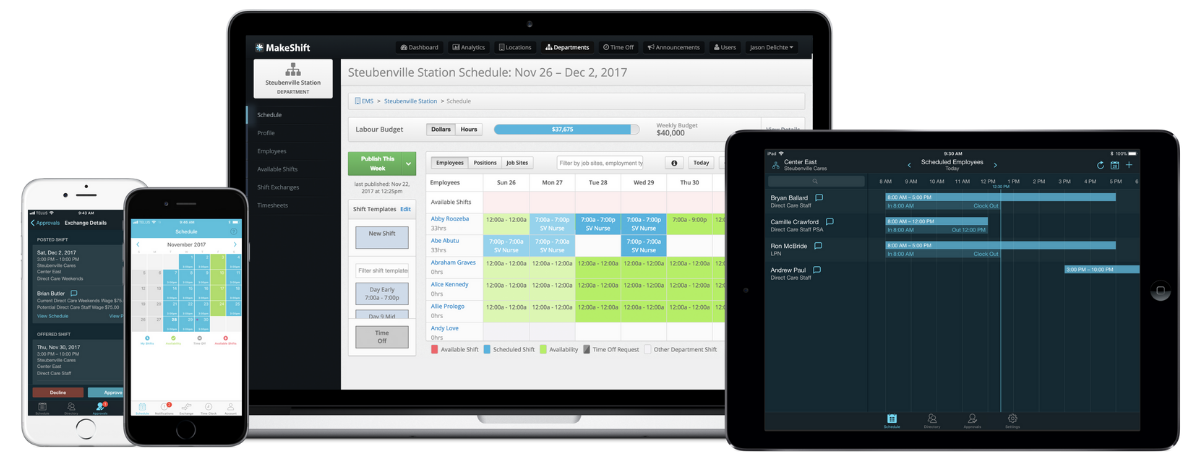Efficient crew scheduling is crucial in the aviation industry, where challenges like regulatory compliance, crew utilization, and operational disruptions happen on the daily.
MakeShift, an AI-powered scheduling platform, offers a comprehensive, intuitive solution to these challenges.
We streamline the scheduling process, ensuring optimal crew placement and compliance with features like:
- Automated scheduling
- Real-time adjustments
- AI-driven work forecasting
- Mobile access
By reducing manual effort, minimizing errors, and enhancing crew satisfaction, MakeShift improves operational efficiency, cost savings, and overall experience for crew and passengers.
Ready to elevate your airline's crew scheduling? Let's explore how MakeShift tackles 8 cost-sucking challenges in airline scheduling.
We'll cover:
- Challenge #1: Relying on Outdated, Old-School Scheduling Methods
- Challenge #2: Regulatory Compliance
- Challenge #3: Crew Utilization
- Challenge #4: Rapid Response to Disruptions
- Challenge #5: Crew Preferences & Morale
- Challenge #6: Cost Reduction
- Challenge #7: Predicting Staffing Needs
- Challenge #8: Immobile Schedule Access
- MakeShift Streamlines Airline Scheduling With the Help of AI
Challenge #1: Relying on Outdated, Old-School Scheduling Methods
Many airline scheduling systems are outdated, cumbersome, and inefficient, relying on manual processes or legacy software.
This old-school scheduling approach can lead to higher operational costs, scheduling errors, and delays in making on-the-fly adjustments, which frustrates staff and clobbers operational efficiency.
You need a system to keep pace with your unique scheduling needs and ensure crew members are assigned based on qualifications, availability, and operational requirements.
Let’s take deadheading as an example.
Inefficient scheduling of crew positioning flights can lead to delays because you don’t have the necessary crew in the right place at the right time.
✷ Swap outdated processes for cutting-edge tech
MakeShift automates the scheduling process, reduces manual effort, and minimizes errors. Our cutting-edge technology makes last-minute schedule adjustments simple — the crew can view schedule changes on their phones.
Our AI-powered scheduling platform offers a suite of generative AI-powered modules to optimize crew scheduling by aligning with the airline industry's rapid pace and synchronization needs.

ShiftMate AI’s Shift Predict, powered by Ikigai Labs, analyzes historical data and stitches it with other data sets to identify patterns that allow you to predict and fine-tune future schedules accurately. Shift Predict can make scheduling your crew positioning flights much more accurate.

Challenge #2: Regulatory Compliance
Your airline must adhere to strict regulations regarding work hours, rest periods, and fatigue management to ensure safety and compliance. Non-adherence can lead to penalties and jeopardize safety.
How do you stay on top of fatigue management and monitor compliance?
✷ Ensure safe (legal) skies ahead
MakeShift ensures your schedules comply with aviation regulations, automatically flags potential compliance issues, and warns of potential fatigue so you can quickly adjust them.
You can rest easy knowing you’re maintaining safety and avoiding penalties.

Challenge #3: Crew Utilization
Optimizing crew utilization is a pillar of cost efficiency. However, operational disruptions and reserve crew requirements can easily hike labor costs.
For example, having reserve crew members on standby that aren’t utilized wastes resources.
✷ Let AI do the heavy lifting
SmartSupport, one of the modules offered through ShiftMate AI, provides 24/7 scheduling support.
Simply ask it for suggestions for efficient schedules that minimize idle time.
SmartSupport will provide tips and step-by-step instructions to help you achieve this.
An efficient schedule reduces the need for reserve crew on standby, lowering labor costs.

Challenge #4: Rapid Response to Disruptions
As you well know, the airline industry operates 24/7 and requires immediate responses to changes like weather, mechanical issues, and other unexpected events.
An inflexible or slow scheduling system hinders your ability to adapt to and communicate these changes, which quickly leads to:
- Operational disruptions
- Increased costs
- Dissatisfied customers
- Frustrated staff
Many airlines today use outdated scheduling systems that lack instant access to updated schedules. This can result in staff being unaware of last-minute changes, leading to missed shifts, understaffing, or miscommunication.
All of this impacts your ability to maintain timely, reliable service.
✷ On-the-fly crew adjustments
Our modernized and streamlined scheduling replaces stone-aged systems that can’t respond to real-time changes.
With MakeShift Live, you can quickly generate alternative schedules in the event of disruptions and send out a team-wide announcement with push notifications.
Our solution helps minimize the impact on operations and maintains passenger satisfaction and employee morale.

Challenge #5: Crew Preferences & Morale
Balancing crew preferences with operational needs is a delicate balancing act but crucial for employee morale, retention, and well-being. Ignoring employee preferences contributes to low job satisfaction and high turnover.
For example, consistently assigning a crew member to undesirable shifts will likely lead to attrition — no one wants to stay in a work environment that ignores their needs.
✷ Choose people-centered scheduling
MakeShift factors in crew preferences and availability when creating schedules.
This boosts job satisfaction, engagement, and morale, leading to better retention rates.
Our mobile-friendly, people-centric platform is perfect for managing schedules on the go.

- Recruitment & retention advantage:
In job postings, you can highlight that you use advanced staff scheduling software as a selling point. This demonstrates a commitment to work-life balance, employee mental health, and modern tech to make scheduling employee-centric.
The ability (& willingness) to accommodate personal preferences and requests makes joining your airline more attractive to potential hires.

And that’s becoming more important every day.
As you’re well aware, the U.S. already has an acute pilot shortage, roughly 11% of today’s pilot supply, or almost 8,000 pilots, and this gap is expected to widen throughout the next 10 years.
Focusing on retention must be high on your priority list.
- Work-life balance affects retention:
Look, it’s no secret that work-life balance is an ongoing struggle for most cabin crew employees. It’s considered a necessary evil of getting to fly for a living.
However, when you prioritize your employees’ well-being by facilitating a better balance between work and personal life, you’ll have lower turnover rates than your competition that doesn’t.
We designed specific features that contribute to work-life balance, like shift swapping, vacation bidding, and employee availability.

Challenge #6: Cost Reduction
Flight cancellations can be costly due to controllable delays, including crew scheduling problems. Over time, this heavily impacts your bottom line.
Labor and fuel costs are your top expenses. And since you have less control over fuel costs, reducing labor costs wherever possible is a top priority.
A flight canceled due to crew scheduling problems can cost between $2,750 and $42,890, depending on the aircraft type.

Inefficient scheduling and excessive reserve crew requirements inflate costs unnecessarily.
✷ Create schedules that save money auto-magically
Our solution helps optimize schedules to improve crew utilization and reduce labor costs. Our features help lower labor costs in 7 ways — some of these have already been mentioned, but do double duty by cutting costs as well:
- Optimized scheduling — MakeShift automates scheduling, ensuring crew members are assigned based on qualifications, availability, and operational requirements. This reduces the need for reserve crew and minimizes idle time, leading to more efficient use of labor resources.
- Demand forecasting — ShiftPredict powered by Ikigai Labs, can analyze historical data and forecast staffing needs, allowing you to schedule the correct number of crew members based on anticipated demand. This prevents overstaffing and slashes unnecessary labor costs.
- Reduced manual effort — By automating scheduling tasks, MakeShift reduces the need for manual intervention, which can drain time and money. This streamlines the scheduling process and lowers administrative costs.
- Real-time adjustments — In the event of operational disruptions, MakeShift can quickly generate alternative schedules, reducing the impact on operations and avoiding the costs associated with delays and cancellations.
- Fatigue management — Our solution can incorporate fatigue management rules, ensuring crew members are adequately rested. This reduces the risk of errors and safety incidents, which can be costly in terms of penalties and damage to reputation.
- Mobile access — MakeShift's mobile app allows crew members to access their schedules and receive phone updates. The app improves communication and reduces the likelihood of missed shifts or scheduling errors, which can lead to extra labor costs.
- Employee self-service — Crew members can use the MakeShift app to request time off, swap shifts, or bid for vacations. This empowers employees to manage their own schedules, reducing the administrative burden on scheduling staff and lowering labor costs.
Challenge #7: Predicting Staffing Needs
Accurate forecasting of staffing needs and identifying trends are essential for informed decision-making. Without proper work forecasting, you may either overstaff or understaff flights, leading to inefficiencies, customer and employee frustration, and damage to your airline’s rep.
✷ Forecast your workforce like the weather (or better)
MakeShift provides AI-powered data analytics tools to forecast staffing needs and identify trends, helping you make informed decisions about resource allocation.
Ask ShiftPredict for help with work forecasting to make future schedule creation a breeze.

MakeShift and ShiftMate AI help you create more stable and predictable schedules, reducing last-minute changes and uncertainty.
Consistent schedules positively impact job satisfaction and overall well-being.
Many flight crews miss family events and holidays because of work. The more consistent scheduling your airline can offer, the more enticing it’ll be to potential employees.
Challenge #8: Immobile Schedule Access
Staff, particularly flight crews, need to be able to access their schedules and receive updates on the fly. The absence of a mobile-friendly platform means your staff can’t quickly check or adjust their schedules.
This stifles flexibility and affects their work-life balance and job satisfaction.
✷ Put your crew’s schedule in their pockets
The MakeShift app for iOS and Android gives your employees up-to-date access to their work schedules and makes submitting requests a cinch. When they have access to their schedule in their pocket or purse, it offers a flexibility that meshes with their lives.

MakeShift Streamlines Airline Scheduling With the Help of AI
We developed MakeShift to solve the clunky, chaotic scheduling that plagues the schedule management of many deskless workers, such as flight crews.
When we saw how our intuitive scheduling solution revolutionized staff scheduling, we knew we could further elevate it by adding AI-powered support.
You can create more effective flight crew schedules based on employee availability, projected budgets, and an optimal schedule template with the help of ShiftMate AI.
MakeShift addresses the scheduling challenges in the airline industry, from regulatory compliance to cost reduction and crew satisfaction.
Achieve more efficient, compliant, and morale-boosting operations with the help of AI and mobile technology, securing your competitive edge in this industry.
Ready to see what MakeShift can do for your staff scheduling? Schedule a FREE demo today.
Disclaimer: Content in this blog is provided for informational purposes and reflects our knowledge and understanding at the time of publication. We disclaim any liability for decisions based on this information, as future developments may affect its accuracy or completeness.








